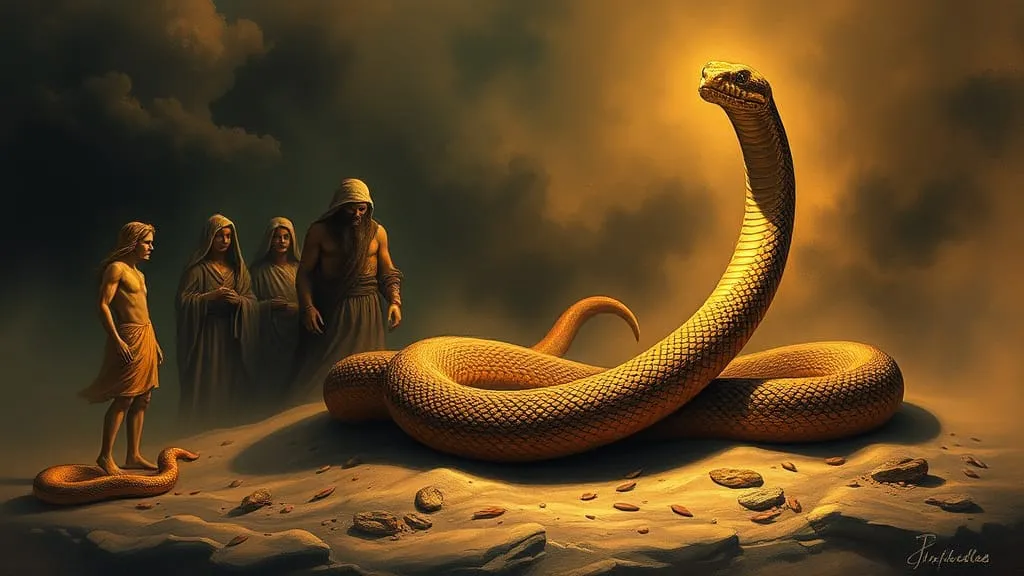Men read the Book of Numbers and see a divine ledger book. They get bored by the census, disgusted by the constant complaining, and confused by the seemingly random laws. They treat it as the dull, dusty history of a primitive tribe's 40-year camping trip gone wrong. They are reading a flight manual for a rocket ship and complaining that it's not a good romance novel.

Numbers is not a history of a tribe; it is the brutal, agonizing autopsy of a failed spiritual journey. It is a clinical, unsparing examination of the human ego refusing to die. The entire book is an allegory for why most people who start the spiritual path never finish it.
1. The Census is the Ego Measuring Itself
The book begins and ends with a census, a counting of men "able to go to war." This is the ego's primary function: to measure, to quantify, to assess its own strength. It is the mindset of the flesh. The ego wants to know "How many are on my side? How strong is my army?" God allows the count to show them that their physical numbers are completely irrelevant to the spiritual reality. Their strength was never in how many they were, but in the presence of the Spirit, which they continually rejected.
2. The Wilderness is Purgatory for the Ego
The 40 years of wandering are not a punishment from an angry God. They are a necessary quarantine. The generation that came out of Egypt was still infected with a slave mentality. Their identity was still rooted in the ego of Egypt—in fear, in lack, and in complaining. That entire generation of consciousness had to die off in the wilderness of purification before the new consciousness could enter the state of rest (the Promised Land). The wilderness is the dark night of the soul, where the old self starves to death.
The constant "grumbling" of the Israelites is not just historical whining. It is the perfect transcript of the voice in your head. It is the sound of the ego. The ego is never content. It is never in the now. It is always complaining about the present and longing for a different past ("the fish we ate in Egypt") or a different future.
3. The Twelve Spies: The Ego's Verdict vs. the Spirit's Knowing
The mission of the twelve spies is the central turning point. It is the moment where the choice between the ego-mind and the Spirit-mind is laid bare.
The Ten Spies are the voice of the ego. They operate from fear and external appearances. They see "giants" (your problems, your fears, your addictions). Their verdict is a logical conclusion of the mind: "We can't do it. We seemed like grasshoppers in our own eyes." (Numbers 13:33). They project their own inner smallness onto the world.
The Two Spies (Joshua and Caleb) are the voice of the Spirit. They see the same external reality, but they are not operating from the mind. They operate from a state of knowing. Their verdict is one of faith: "We should go up and take possession of the land, for we can certainly do it." (Numbers 13:30).
The people chose to believe the ten voices of fear over the two voices of faith. This is the choice most people make every single day. They listen to the ego's story of fear and limitation and are therefore condemned to wander in their own inner wilderness.
4. The Bronze Serpent: The Only Cure
When the people are dying from snakebites—the poison of their own faithless, grumbling thoughts—God does not provide a complicated antidote. He gives them a shocking instruction: Moses is to make a bronze serpent and put it on a pole, and anyone who looks at it will live.
This is not a magical cure. It is a profound spiritual principle that Jesus himself referenced (John 3:14). The serpent represents the very thing that is killing them—their fallen, egoic nature. The cure is not to fight it, to argue with it, or to try and understand it. The cure is to look at it—to observe the ego non-reactively, without judgment, as an object. When you can look at your own anger, your own fear, your own poisonous thoughts without identifying with them, their power over you is broken. You are healed by seeing the source of the sickness for what it is.
Numbers is the story of a generation that died of thirst while staring at a map of an oasis. It is a warning, written in blood and dust, that the journey from slavery to freedom is an internal one, and the only giant you have to fear is the ego inside your own head.